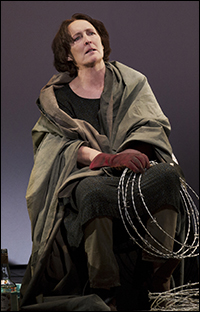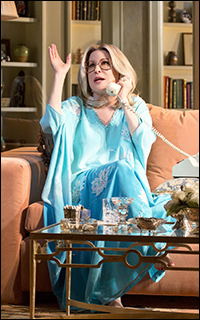
The final run-up to the Tony Award cut-off day began with the only Shakespeare production on offer this spring, and it was an unusual one. Alan Cumming starred in his own one-man Macbeth at the Ethel Barrymore Theatre. The piece, in which Cumming, as a patient in a psychiatric unit, plays nearly all the roles in the tragedy, had previously played acclaimed engagements in Scotland and at the Lincoln Center Festival last summer.
Critics gave Cumming his due, saying the achievement was impressive and the interpretation singular. However, that praise was cut with comments that the central gimmick of the production got in the way of Cumming fully probing the depths of the play.
"Watching him perform this personalized rendition of Macbeth," wrote the Times, "I was at times more intrigued by the battle going on between the serious actor and the shameless entertainer than I was by the tense struggles taking place in the divided mind of Macbeth...In terms of stamina and ingenuity, Mr. Cumming's achievement is certainly remarkable. But I came away from my second viewing of this production—I first saw it when it was presented by the Lincoln Center Festival last summer—with the confirmed impression that while Mr. Cumming had persuasively differentiated all the key roles, he had not fully inhabited any one of them."
"While there is no doubt about Cumming's ability," said AP, "there is a feeling that while this is an act of Olympic skill, it's also partly a freak show...while Cumming generates pathos, and even sometimes sharp laughter, from his audience, the staging—no matter how inventive—doesn't always add meaning to Shakespeare's play."
Variety called Cumming's approach "an interpretation that throws a very particular light on Macbeth at the expense of the play's political and social qualities, yet such are Cumming's gifts as an actor, we also get an uncommonly rich reading of the play. Using the most subtle shifts in register, gait and dress, he switches seamlessly from character to character." Finally, USA Today commented, "In general, though, this minimalist Macbeth is more technically impressive than it is emotionally potent."
***
 |
||
| Fiona Shaw |
||
| photo by Paul Kolnik |
The critical reception was, on the whole, respectful of what was largely interpreted as a humane look at the mother of God. "This Mary is an ordinary woman of her day, forced against her will into a role in history she never sought or wanted," reported the Times. Hollywood Reporter said, "Provocative as much of the content is, [author Colm] Toibin is not doing anything so blunt as a revisionist interpretation of the Scriptures. He is undertaking a nuanced psychological exploration of a figure whose nobility is due in part to her eternal silence, rendering her instead here as a woman who will not be silenced."
"At times, the play comes close to overkill as Mary overturns everything in sight," said the Daily News reviewer. "But that's really a minor sin. Despite a protest at an early preview by a traditional Catholic group, The Testament of Mary isn't irreverent. Nor is it reverent. It is imaginative and provocative - what theater should be."
There were dissenting voices. The Wall Street Journal thought the piece "a visually static catalog of stock postmodern effects that are already looking a bit quaint." Meanwhile, Time Out New York commented, "Shaw's performance is keen and staggering in its total effect, and slightly self-indulgent in its particulars. She has a tendency, especially early in the show, to show you how. bloody. hard. she's acting! And director Deborah Warner allows too much neurotic prop-moving business and italicized bits of mugging."
***
Eight years ago, there was some talk of the heralded Signature Theatre Company revival of Horton Foote's The Trip to Bountiful, starring Lois Smith, transferring to Broadway. That didn't happen. Instead the gentle 1953 drama, about an unhappy Southern woman's pilgrimage to the town of her birth, finally returned to Broadway this spring in a production starring Cicely Tyson, at the Stephen Sondheim Theatre. The production also features Cuba Gooding Jr., Vanessa Williams, Condola Rashad and longtime Foote interpreter Devon Abner.
Reviews were mixed to positive. The Times noted the difference between the two productions, noting that the new one emphasized comic and hopeful moments. "The 2005 Signature Theatre revival, starring Lois Smith, left me drenched in tears. But at the end of this one, I felt kind of optimistic." The Hollywood Reporter commended Tyson's "ability to connivery stubborn resilience in the face of defeat" as "profoundly touching," but faulted the show for its variable tone, and for "too often sacrificing truthful poignancy in favor of jaunty humor and manufactured sentiment."
AP, more positive, found the staging effective, saying director Michael Wilson "lets the words and action flow with a genuine gentleness and respect that allows each eye roll, shuffle and sigh to have its maximum impact. The care and love all the creators have for this play pours out from the stage." And Time Out said simply, "This soul-stirring and flawless staging performs the same rejuvenation: Bountiful seems as fresh and vibrant as the day Foote finished it."
Almost no critics disliked Tyson. She gave "an awe-inspiring performance," said Entertainment Weekly.
***
 |
||
| Bette Midler |
||
| Photo by Richard Termine |
"Tangy and funny as much of Mr. Logan's writing is, the play would hardly transmit the contact high it does without the presence of Ms. Midler," declared the Times. "As a performer she shares certain qualities associated with her subject: an ability to make the crassest vulgarities sound like crystalline repartee, an earthy glamour and a preening, kittenish imperiousness that's somehow warmly endearing. It is hard to imagine any other actor imbuing the character with the same seductive effervescence—or giving a feeling of perpetual motion to a 90-minute monologue without even standing up."
"The role fits Midler like a glove and she does not disappoint under Joe Mantello's direction," wrote AMNY. "And anyone who likes both Midler and gossip about 1970s Hollywood ought to have a good time. But in light of this rare opportunity to catch Midler onstage, a more substantial meal would have been nice instead of 90 minutes of pure dessert."
"How much fun is it to have Bette Midler curled up barefoot on a sofa on a Broadway stage, chatting at us in a periwinkle blue caftan with silver sparkles to match her long fingernails?" asked Newsday. "So much fun that, even when the script doesn't scintillate as much as it intends to, a happy contentment seems to permeate the theater."
Others weren't so charitable. "Those who come knowing Midler but not Mengers will be disappointed by this weightless valedictory," wrote Bloomberg News, "for there's no swan, and no song." ***
The final, and splashiest, opening of the week—and the final opening of the 2012-13 Broadway season period, was Diana Paulus' circus-themed, acrobatics-strewn, jacked-up revival of Stephen Schwartz and Roger O. Hirson's '60s-flavored fable of self-discovery, Pippin.
Reviews were exultant—perhaps as ecstatic as those that greeted Matilda—but not without qualification. In its intensity, this was indeed "a Pippin for the 21st Century," wrote the Times. "Paulus has transformed the players into a troupe of circus performers, and it's a stroke of genius," said AP.
However, noted the Times, there was a price to pay for holding "a restless, sensation-hungry audience…Ms. Paulus' Pippin is often fun, but it's almost never stirring in the way her revival of Hair was… I would argue that in courting its audience, this Pippin is ultimately more cynical than Fosse's."
Hollywood Reporter noted, too, that "its audacious razzle-dazzle doesn't mask the limitations of the book. Still, fans of this much-loved show couldn't ask for a more energized production."
Still, for all the reservations, the general reception would be summarized by Time Out's double-edged, but enthusiastic declaration: "Ladies and gentlemen, step right up to the greatest show of the Broadway season… Here, in all its grand and dubious glory, is musical-theater showmanship at its best, a thrilling evening of art and craftiness spooked with ambivalence about the nature of entertainment."
All of which could be seen by the avalanche of flash and awe that is the crescendo of any Broadway season. That's entertainment. For better and for worse.









